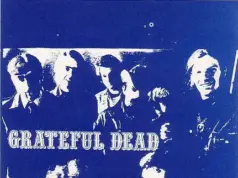
John Perry Barlow’s extraordinary life on earth came to an end on February 7, 2018. Beloved by many adoring fans of the Grateful Dead for his lyrical contributions to many of the band’s favorite songs with his writing partner and lifelong friend Bob Weir, that was just one aspect of Barlow’s remarkable lifetime of achievements.
In his 70 years, Barlow accomplished more than most if given twice that amount of time. Sure, he’s the guy who wrote the words to “Cassidy,” “Throwing Stones” and “The Music Never Stopped,” but Barlow was also just as comfortable working on future Vice President Dick Cheney’s 1978 Congressional campaign in his native Wyoming, as he was working on a ranch in his home state.
For many Deadheads when they hear the name “John Perry Barlow,” Weir singing one of his late buddy’s poignant lyrics is instantly summoned. For many others who hear the name “John Perry Barlow” an entirely different memory surfaces, one that recalls a man who was a pioneer and leading activist for digital and online rights. When few were familiar with the internet, Barlow was co-founding of the Electronic Frontier Foundation back in 1990. Barlow was also integral in 2012 in founding the Freedom Of The Press Foundation.
Barlow’s advocacy was prescient, recognizing the digital direction the world was heading years before the explosion of online importance. He could see a growing, technology-driven, inner-connectivity growing within humankind and creating a truly global community. Throughout his many endeavors, Barlow saw humanity in a singular way that allowed him to have a positive impact across a wide spectrum of interests. His wisdom ran deep and he was generous to share it.
One of Barlow’s most transcendent and enduring contributions was written on October 3, 1977 – his 30th birthday. Known as the “Principles Of Adult Behavior,” Barlow compiled a list of 25 guidelines for living a life of integrity. He described what led to the list in his memoir, Mother American Night: My Life in Crazy Times, explaining:
On October 2, 1977 I had the forehead-slapping realization that I was about to become an age above which nobody could be trusted. In fact, I’m still not sure that it makes good sense to trust people over 30. While I had no aspirations to become a grown-up—and I think we all know what that is — I did want to be an adult who was regarded as responsible. I could no longer excuse my peccadilloes on the basis of youth. They had fallen into a less pleasant category, like bad manners. I went to bed on the eve of my 30th birthday only to realize all this, and so I got back up and spent the balance of the night composing a list of advisories to myself that I called “Principles Of Adult Behavior.” Most of them were blandly inarguable, the sort of platitudes that Polonius had laid on Hamlet. Because I advocated avoiding the pursuit of happiness, this particular homily served to actively piss off the broadest range of folks you could imagine. Over the course of the ensuing years, I have done my best to keep the list posted wherever I am.
Barlow lays out instructions for leading a life of tolerance and self-accountability. The list is filled with words like “responsibility,” “dignity,” “respect,” “tolerate” and “humility” that construct steps intended to squash unhealthy arrogance in favor of reminding the reader that we are on this planet together and are reliant upon each other for not only our existence but our happiness. That sentiment comes out in “Throwing Stones” when Weir sings, “The future’s here, we are it, we are on our own,” — we as humans are all we have and we are collectively on own, together.
Whether you agree with each of the entries or not, the 25 Principles Of Adult Behavior have a timelessness that maintains relevance more than 40 years later. Barlow had a vision of the world that we’re lucky to have been given repeated glimpses of through his lifetime of creating and advocating.
Fare thee well, John, we’ll do our best to endure without you.
Principles Of Adult Behavior
- 1. Be patient. No matter what.
- 2. Don’t bad-mouth: Assign responsibility, not blame. Say nothing of another you wouldn’t say to him.
- 3. Never assume the motives of others are, to them, less noble than yours are to you.
- 4. Expand your sense of the possible.
- 5. Don’t trouble yourself with matters you truly cannot change.
- 6. Expect no more of anyone than you can deliver yourself.
- 7. Tolerate ambiguity.
- 8. Laugh at yourself frequently.
- 9. Concern yourself with what is right rather than who is right.
- 10. Never forget that, no matter how certain, you might be wrong.
- 11. Give up blood sports.
- 12. Remember that your life belongs to others as well. Don’t risk it frivolously.
- 13. Never lie to anyone for any reason. (Lies of omission are sometimes exempt.)
- 14. Learn the needs of those around you and respect them.
- 15. Avoid the pursuit of happiness. Seek to define your mission and pursue that.
- 16. Reduce your use of the first personal pronoun.
- 17. Praise at least as often as you disparage.
- 18. Admit your errors freely and soon.
- 19. Become less suspicious of joy.
- 20. Understand humility.
- 21. Remember that love forgives everything.
- 22. Foster dignity.
- 23. Live memorably.
- 24. Love yourself.
- 25. Endure.








